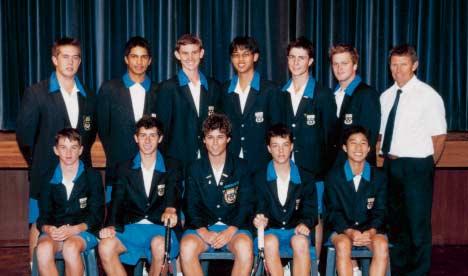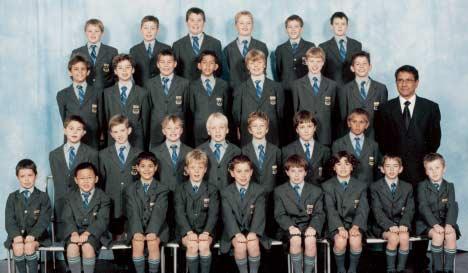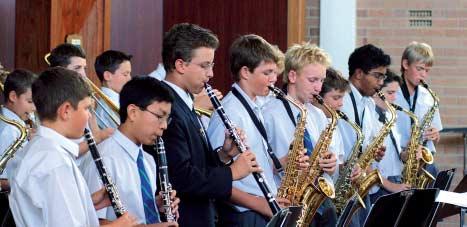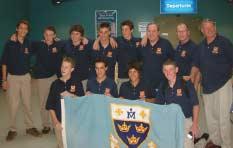Religious Education Faith Education
T
rinity College is an Edmund Rice School and is based on the traditions of the Christian Brothers. As a Catholic school we teach the Catholic tradition. The Religious Education is designed to recognise that students are individuals, Gerard Theseira Director of Faith Formation coming from diverse religious backgrounds. It is not the focus of Religious Education to convince students of certain doctrine, rather we invite students to find meaning in their lives. We hope that students will embark upon their own religious journeys to explore religious traditions and beliefs. Jesus is the model of living fully and He has called each person to live that same kind of life. The Religious Education programme at Trinity College beckons each student to fulfil his complete potential, which for every person is to love and be loved. God sent Jesus to show people how much they were loved by God and how they in turn can love others. The Religious Education courses are, however part of the Academic Curriculum and so respond to the necessary rigours associated with academic requirements. Students are expected to complete two common assessments in the form of a research assignment and a test in each term. They are also required to record all class work in the Religious Education Journal. This Journal is a reflection of their work during the year. It is imperative that students maintain the condition of this Journal. We strongly encourage parents to ask their sons to show their Journals on a regular basis. For many years all Trinity students have been required to purchase a Bible; since 2002 we have prescribed The Catholic Youth Bible. It contains key features which engage young people helping them understand the Bible in context, historically and currently. The academic nature of this programme distinguishes it from other types of religious formation that takes place in our College and in the individual student’s faith community. These other types of religious formation are found in: Campus Ministry, Christian Service and the Chaplaincy. A detailed outline of the programme follows: Understanding Catholic Christianity offers our Year 8 students an overview of Catholicism. This course serves as a foundation for the other High School Religious Education courses and faith formation experiences they will have. It also provides a common vocabulary for articulating the essentials of Catholic teaching. This course was developed using the Catechism of the Catholic Church as a primary
source. The course does not assume a Catholic background or a committed faith in the students, but can bring Catholic and non-Catholic young people alike to a deeper appreciation of Catholicism’s beliefs, rituals, moral vision, and prayer life – and how that rich heritage can relate to their young lives.
Religious Education
Jesus of History, Christ of Faith invites our Year 9 students to understand Jesus through a study of the New Testament. The course first considers the New Testament as a whole, particularly the Gospels, and moves to the Jewish historical, religious, and cultural world into which Jesus was born. Using the Gospels as primary sources the course explores Jesus’ birth, early life, and ministry; His preaching of the Kingdom of God; His special teachings, particularly the parables; and His miracles. It then focuses on the scriptural accounts of His death and Resurrection, the Ascension, and Pentecost, and their central significance for the Church’s understanding of Jesus as the Christ, the Son of God. The course then explores Paul’s missionary work and how his Epistles develop major themes in his theology. The course closes with an overview of the development of Christology after the New Testament to the present. Living Justice and Peace Catholic Social Teaching in Practice is a course that teaches our Year 10 students about how the Scriptures and Catholic social teaching call them to justice. This course fosters the student’s ability and desire to response to that call. The Year 11 course Growing in Christian Morality focuses on the development of virtue and character. It helps students raise the important question, “What kind of person am I becoming?” and “What kind of person do I want to become?” The course then offers a Christian version for answering this question, centering on Jesus as the model of full humanness and presenting the Tradition of Catholic Church teaching on contemporary moral issues. Creating a Christian Lifestyle The immediate goal of this programme is to provide the students with the necessary methods of coping with the opportunities, challenges and development tasks facing them in young adulthood. As the Year 12 students come to a better understanding of themselves, they will have a clearer understanding of the life style issues and choices in the light of the Gospel and the Christian tradition. Through the activities within the programme, students will value of their own personhood more deeply and realise God’s love for them. The fundamental understanding is based upon their empowerment. Students will seek peace and justice as part of their lifestyle. Gerard Theseira Director of Faith Formation 151






















































